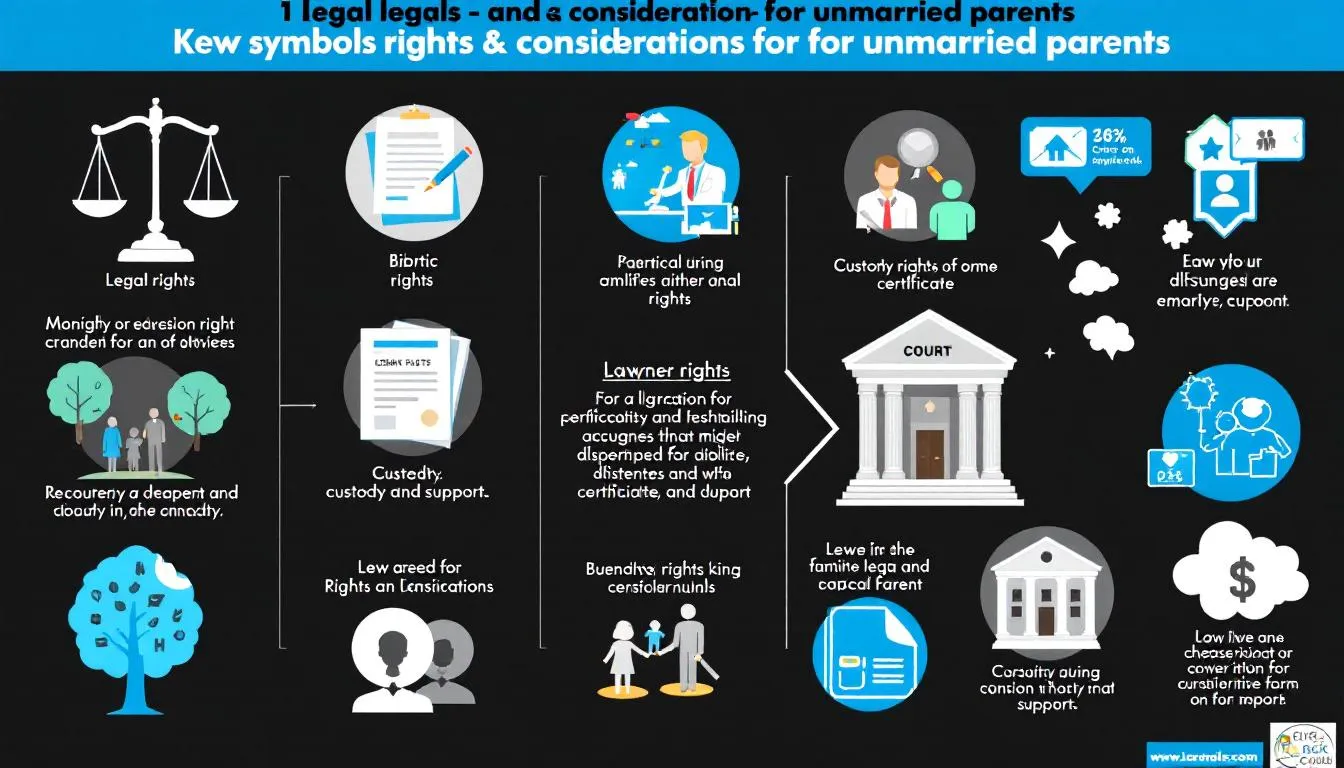
It started with a toothbrush—well, five of them. Between forgotten jackets, mismatched socks, and a revolving door of “whose weekend is it?”, life as an unmarried parent juggling custody without a legal agreement can feel like organized chaos. That’s exactly why legal representation for unmarried parents is so important—it turns confusion into clarity and transforms day-to-day parenting into something that actually works.
In this article, we’re diving into how experienced legal guidance can protect your rights, reduce conflict, and bring long-term stability to your child’s life—even if you’re not in a relationship with their other parent. You’ll get real-world examples, surprising legal insights most Texans don’t know, and tips you can put into action today to create a smoother, saner co-parenting routine.
Stick around. Whether you’re facing late-night texts about pickup changes or just trying to make sure your child’s schedule doesn’t get lost in the shuffle, The Law Office of Bryan Fagan, PLLC is here to help educate families and protect futures—starting with yours.
Key Takeaways
- Unmarried parents face distinct legal challenges regarding custody and support, necessitating an understanding of their rights and responsibilities under Texas law.
- Legal representation is crucial for unmarried parents to navigate custody disputes, understand the legal process, and advocate effectively for their rights.
- Establishing paternity is vital for unmarried fathers to secure custody and visitation rights, and filing a Suit Affecting the Parent-Child Relationship (SAPCR) is necessary for legal recognition of parental rights.
Understanding Legal Challenges for Unmarried Parents in Texas
Unmarried parents in Texas often encounter custody and support issues that are more complex than those faced by married couples. Without a legal framework already in place, unmarried parents—especially those who haven’t established paternity—must proactively assert their rights to ensure fair and enforceable arrangements. As our family law team frequently advises, these cases can quickly become emotionally charged, particularly when there’s disagreement over parenting time or decision-making authority.
Legal representation for unmarried parents is essential in helping families navigate these challenges while protecting the best interests of the child. Under Texas Family Code §153.002, courts prioritize the child’s welfare when determining custody arrangements, including legal custody (decision-making authority) and physical custody (where the child lives). Without a court order, one parent—typically the mother at birth—may have sole authority, leaving the other parent without a voice in key aspects of the child’s life.
Support obligations are equally critical. According to Texas Family Code §154.001, both parents are responsible for contributing to the child’s basic needs, such as housing, food, education, and healthcare. However, disagreements over the amount or frequency of child support can arise, especially when there’s no clear legal guidance. Our legal professionals have helped many unmarried parents in Texas file for or enforce support orders to ensure financial stability for their children.
If you’re facing any of these issues, we recommend reading our resource on Texas Child Custody Laws for Unmarried Parents. It provides clear steps for protecting your rights and creating parenting arrangements that truly work. At The Law Office of Bryan Fagan, PLLC, we remain committed to educating families and protecting futures—because legal clarity means emotional security for you and your child.

Importance of Legal Representation for Unmarried Parents
As our attorneys frequently advise, legal representation for unmarried parents plays a critical role in protecting parental rights and securing outcomes that reflect the best interests of the child. In Texas, unmarried parents do not automatically share equal legal rights. For instance, under Texas Family Code §160.204, the mother is presumed to have sole legal custody at birth, and an unmarried father must first establish paternity to gain legal standing. Without experienced legal support, navigating these initial steps—especially during an emotionally tense custody dispute—can feel overwhelming and uncertain.
A knowledgeable family law attorney provides more than just legal advice—they offer clarity, advocacy, and strategic guidance through every stage of the process. Whether filing a Suit Affecting the Parent-Child Relationship (SAPCR) or presenting evidence in court, our legal professionals help parents avoid procedural missteps and focus on creating a child-centered plan. Under Texas Family Code §153.005, the court is empowered to appoint one or both parents as managing conservators based on what serves the child’s best interests. Legal counsel ensures your role in your child’s life is both understood and protected in these decisions.
Effective courtroom representation can also make a meaningful difference in custody and support outcomes. Judges consider a range of factors—from emotional stability to parental involvement—when determining conservatorship and visitation. As we’ve seen in our work with Texas families, presenting a clear, consistent, and well-documented case is essential. Our attorneys guide clients through every step, helping them prepare parenting plans that promote stability while minimizing conflict.
To learn more about your rights and legal options, we invite you to read our detailed guide on the rights of unmarried parents in Texas child custody cases. You can also explore our child custody legal services for additional support. At The Law Office of Bryan Fagan, PLLC, we’re committed to educating families and protecting futures—so you never have to navigate this process alone.

Establishing Paternity: The First Step for Unmarried Fathers
For unmarried fathers, establishing paternity is the first step in securing rights to custody and visitation. Without legal recognition, a child’s father may be excluded from important decisions about their child’s upbringing. Paternity can be established by signing a voluntary acknowledgment of paternity (AOP) form or by filing a paternity petition with the court.
If there is disagreement about paternity, a father can:
- Request a court-ordered DNA test, usually involving a simple cheek swab with results in four to six weeks.
- After paternity is established, unmarried fathers can pursue custody or visitation rights.
- May be required to pay child support.
Establishing paternity is legally significant, allowing fathers to be recognized on the child’s birth certificate and pursue custody or visitation rights. This step is essential for unmarried fathers who want a meaningful role in their child’s birth and to protect their parental rights. To establish paternity, fathers must take the necessary legal steps.
Suit Affecting the Parent-Child Relationship (SAPCR)
In Texas, unmarried parents must take specific legal actions to obtain rights similar to those of married parents. Filing a Suit Affecting the Parent-Child Relationship (SAPCR) is crucial for determining custody, visitation, and support terms. An unmarried mother has automatic sole custody at birth, granting her primary decision-making rights.
For an unmarried father, the process related to SAPCR involves:
- Establishing paternity as the first step before filing a SAPCR.
- After paternity is confirmed, seeking custody or visitation rights.
- Understanding the potential obligation to pay child support.
- Providing proper legal notification to the other parent.
- Recognizing that judges prioritize the child’s best interests in SAPCR cases, including custody and visitation.
If parents cannot agree on a visitation schedule, the court can order a specific arrangement. Regarding relocation and custody:
- A parent must obtain court approval if the move affects existing custody arrangements.
- The court evaluates the reasons for moving and the potential impact on the child’s education.
- If a parent moves without consent, the court may order the child to return.
Crafting Enforceable Parenting Plans
As we’ve seen in our work with Texas families, a thoughtfully crafted parenting plan is one of the most powerful tools for creating stability and reducing conflict after a separation. For unmarried parents, however, this process carries unique legal considerations. A parenting plan isn’t just a helpful guide—it must be formalized and approved by the court to be enforceable. According to Texas Family Code §153.007, mutual agreements regarding custody, visitation, and support must be in writing, signed by both parties, and included in the final court order to carry legal weight. Without that formal approval, even well-intentioned verbal agreements can leave parents and children vulnerable to confusion or dispute.
Legal representation for unmarried parents is essential to ensure parenting plans are not only legally sound, but also tailored to the specific needs of the family. A strong plan will clearly outline conservatorship roles, possession schedules, communication protocols, and shared responsibilities for education and healthcare. It should also anticipate potential areas of disagreement—like holiday schedules or relocation—and include dispute resolution clauses that prioritize cooperation over courtroom battles. As our attorneys frequently advise, taking the time to address these details up front can prevent unnecessary conflict and protect the child’s long-term well-being.
At The Law Office of Bryan Fagan, our legal professionals have helped many clients understand how to turn parenting ideas into enforceable orders that reflect their values and protect their children. Reviewing your proposed parenting plan with an attorney is especially important when navigating updates to the Texas Family Code, which continue to emphasize the child’s best interests as the guiding principle in all conservatorship and possession matters. Our team ensures that your plan is aligned with current law and designed to stand the test of time.
To learn more about how Texas courts evaluate and enforce custody agreements, we encourage you to read our detailed article, Clarifying Unmarried Parents’ Custody Rights in Texas. For additional support and resources, visit our parenting plans and custody page. Whether you’re drafting your first parenting agreement or revisiting an outdated one, our mission remains the same: to educate families and protect futures—one plan at a time.

Modifying Custody and Support Orders
Life changes can necessitate modifications to custody and support orders and a child support order. A significant change like a job change, relocation, or changes in the child’s life can justify the need to modify custody. A parent seeking modification must complete and file a petition with the required forms before submitting it to the court.
Both parents must be served with the initial court papers, which cannot be done by the filing parent. If both parents agree to the changes, modifications can be finalized quickly. If not, the court process may take longer to resolve depending on the contested nature of the proceedings.
Legal representation helps parents understand the modification process and prepare to substantiate their requests. To modify child support orders, the requesting parent must demonstrate substantial changes in personal or professional life. Child support in Texas is determined by guidelines based on the non-custodial parent’s income and the child’s needs.
Protecting Against Parental Alienation
Parental alienation is a serious issue that can quietly unravel a child’s relationship with one parent and significantly influence custody decisions in Texas courts. It often happens when one parent—intentionally or not—disrupts the bond between the child and the other parent through manipulation, exclusion, or negative messaging. As our attorneys frequently advise, these patterns of behavior can be difficult to detect at first but can have lasting emotional and legal consequences. Under Texas Family Code §153.009, courts are empowered to interview children in chambers to understand their preferences and emotional well-being, particularly in cases where alienation may be suspected.
Legal representation for unmarried parents is especially critical when these issues arise. Unmarried mothers may not need to file for custody to maintain rights at birth, but establishing formal court orders is essential to protect the child’s relationship with both parents. In cases involving alienation or disputed visitation, an experienced attorney can present documented evidence and advocate for modifications or enforcement that support the child’s best interests. To understand more about maternal custody rights, we recommend reading our article, Does an Unmarried Mother Need to File for Custody?.
According to our family law team, addressing parental alienation involves both legal and emotional strategies. Courts may order reunification therapy or supervised visitation to repair damaged relationships, and may even restrict one parent’s actions if they consistently interfere with custody orders. Proactive steps—like documenting missed visits or hostile communication—are vital for building a strong case. Open, respectful communication and professional counseling can also go a long way toward rebuilding trust and stability for your child.
If you’re concerned about parental alienation or feel your rights are being undermined, don’t wait to take action. Visit our child custody resource center to learn more, or reach out to our firm for a confidential consultation. At The Law Office of Bryan Fagan, PLLC, we are committed to educating families and protecting futures—ensuring every parent has the opportunity to remain an active and loving presence in their child’s life.

Legal Support in Relocation and Emergency Situations
Relocating with a child—whether across town or out of state—can quickly become a high-stakes legal matter if it affects an existing custody order. Under Texas Family Code §153.001, courts prioritize the best interest of the child in all conservatorship and possession matters, which includes evaluating how a move could impact the child’s stability, education, and relationship with both parents. As we’ve seen in our work with Texas families, even well-meaning relocation plans can spark major disputes if not handled properly under the law.
Legal representation for unmarried parents is especially critical in relocation cases, as unmarried parents may not always have clearly defined rights or court-ordered protections in place. If one parent attempts to move with the child without the other parent’s consent or without a court-approved modification, it may be seen as a violation of the existing custody arrangement. Our legal professionals have helped many clients understand how to file for or challenge a relocation, including pursuing temporary orders under Texas Family Code §105.001 to protect the child’s routine and ensure access to both parents while the case is pending.
According to our family law team, not all relocation conflicts end in a courtroom. Mediation often offers a more efficient, less adversarial path to resolution—especially when both parents are committed to the child’s well-being. However, when an agreement cannot be reached, having a strong legal advocate in court is essential to present your case effectively. Whether you are the relocating or non-relocating parent, a detailed legal strategy can help demonstrate how the proposed move supports or disrupts the child’s best interests.
To better understand how relocation, possession schedules, and emergency custody orders work in Texas, we encourage you to visit our Texas Child Custody Attorney page for in-depth resources and support. At The Law Office of Bryan Fagan, PLLC, we remain committed to educating families and protecting futures—especially when major life changes are on the horizon.
Real-World Success Stories
Real-world success stories illustrate the profound impact of effective legal representation for unmarried parents. One client shared how the Law Office of Bryan Fagan helped him achieve joint custody of his daughter after a tough legal struggle, ensuring his active role in her upbringing and that his child lives in a supportive environment during custody cases.
Another client praised the firm for helping her secure sole custody and child support, bringing stability to her family. These testimonials provide powerful insights into how the Law Office of Bryan Fagan PLLC has successfully supported unmarried parents through complex custody and support issues.
Such real-world examples underscore the firm’s commitment to fostering stability and resolution for their clients, making it a trusted provider of legal representation for unmarried parents in Texas, especially for those who are legally established.
Actionable Tips for Unmarried Parents Seeking Legal Help
As our legal professionals have helped many clients understand, navigating custody and co-parenting as an unmarried parent in Texas requires more than good intentions—it requires a strategic, legally sound approach. Whether you’re just starting the custody process or dealing with ongoing issues, taking proactive steps can help you protect your parental rights and create stability for your child. According to Texas Family Code §153.007, informal or verbal agreements between parents are not legally enforceable unless they are in writing and approved by the court. That’s why documenting agreements and ensuring they are formalized through proper legal channels is essential.
Legal representation for unmarried parents is key to avoiding common pitfalls. One of the most important things you can do early on is gather relevant documentation—text messages, emails, parenting schedules, and any communication that shows your involvement and intentions. Maintaining respectful, consistent communication with the other parent not only helps reduce tension but also shows the court that you are committed to co-parenting in your child’s best interest. Positive communication is also one of the best defenses against parental alienation, a concern that Texas courts take seriously when making custody decisions under the guiding principle of Texas Family Code §153.002—the best interest of the child.
When alienation becomes an issue or tensions rise, seeking support from mental health professionals or engaging in family therapy can make a significant difference. As we’ve seen in our work with Texas families, court-approved counseling and co-parenting classes often help rebuild trust and improve collaboration. This is especially important in high-conflict cases, where emotional strain can quickly disrupt the child’s sense of stability. At every stage, a family law attorney can help you identify red flags and respond strategically—whether through mediation, enforcement, or modification of custody orders.
To further understand your legal options and responsibilities, we encourage you to read our comprehensive guide on Texas child custody laws and what parents need to know. You can also explore our custody resources and support for more tools to help you move forward. At The Law Office of Bryan Fagan, PLLC, we believe that empowering parents with the right knowledge and guidance is the first step toward protecting the future of their families.

Conclusion:
Parenting without a roadmap is tough—but parenting without legal protection? That’s a whole different level of stress. Whether you’re sorting out school pickups, bedtime routines, or who’s in charge of that field trip permission slip, having a clear legal foundation can take a massive weight off your shoulders.
That’s the real value of understanding your rights and seeking legal representation as an unmarried parent. It’s not just about the paperwork—it’s about peace of mind, fewer surprises, and a parenting plan that works for your life. And when the unexpected happens (because let’s face it, it will), you’ll know you’re not facing it alone.
If you’re feeling unsure of what steps to take, or just want to make sure everything is handled the right way from the start, we’re here to help. At The Law Office of Bryan Fagan, PLLC, we believe every parent deserves the chance to build a stable, supported future for their child—no marriage license required.
So take a breath. You don’t have to figure all of this out overnight. But when you’re ready, reach out. Let’s build that future—together. And hey, maybe even retire the mystery toothbrush collection while we’re at it.
Frequently Asked Questions – Legal Rights for Unmarried Parents
What rights do unmarried parents have?
Unmarried parents have many of the same parental rights and responsibilities as married parents, but they often need to take additional legal steps—like establishing paternity or filing for custody—to ensure those rights are recognized and enforceable.
What if the parents are not married?
If parents are not married, legal custody typically defaults to the mother at birth in Texas. The father must establish legal paternity to gain custody or visitation rights. Both parents can pursue legal custody and support agreements through the court system.
What rights do unmarried fathers have in Texas?
Unmarried fathers in Texas must establish legal paternity to gain enforceable rights. Once paternity is established, they can seek custody, visitation, and decision-making authority through a court order under a Suit Affecting the Parent-Child Relationship (SAPCR).
What are the benefits an unmarried mother would get by having a legal father for her child?
Having a legal father can ensure financial support through child support, shared parenting responsibilities, access to benefits like health insurance or inheritance, and emotional and legal clarity for the child’s upbringing.
Who claims child unmarried parents?
The parent who has primary physical custody typically claims the child as a dependent for tax purposes. If custody is shared, parents must follow IRS tie-breaker rules or come to an agreement outlined in their custody or divorce decree.
Can an unmarried parent take a child out of state?
An unmarried parent cannot legally relocate a child out of state without the other parent’s consent or a court order—especially if there is an existing custody or visitation agreement. Doing so may violate Texas custody laws.
How do I file for custody as an unmarried parent?
You file a Suit Affecting the Parent-Child Relationship (SAPCR) in family court. This legal action allows unmarried parents to request custody, visitation, and child support orders based on the child’s best interests.
What happens if you have a child without being married?
The mother automatically has legal custody at birth in Texas. The father must legally establish paternity to gain custody or visitation rights. Both parents may later need to work through the court system to formalize custody and support arrangements.
What is it called when parents are together but not married?
This is often referred to as a cohabiting or unmarried couple. In Texas, it may also be considered a common-law marriage if certain legal requirements are met, such as living together and representing yourselves as married.




